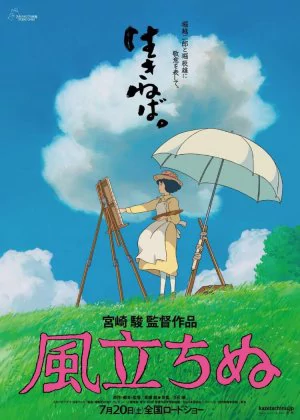The Wind Rises
The Wind Rises [Kaze Tachinu] is not just Hayao Miyazaki's latest, but also his last film as a director. It's his entire career, all rolled up in one final burst of energy, tailored to leave an impression long after he's condemned to sit at home regretting his retirement. It's been a long and somewhat disappointing wait, but I was finally able to see the film in theaters last week. A rare chance I wasn't going to pass up on no matter what.
![screen capture of The Wind Rises [Kaze Tachinu]](/thumbs/img/articles/1200xauto/wind-rises-1.webp)
And in this case, "no matter what" meant taking off two hours from work in the middle of the day. The film was playing at 13:45 with a Rio 2 trailer slotted in before the start of the film. With a schedule like that, you know it's not going to last very long in theaters. For some reason The Wind Rises is being marketed as a kid's film over here, even though your average kid will probably be dozing off 5 minutes into the film. But such is the destiny of animation films in Belgium.
Even though it's not the first time Hayao Miyazaki (My Neighbor Totoro, Ponyo) announced his retirement, this time he seems to be more serious than ever (going by the official statement and press conference that was held after the release of The Wind Rises). It's hard to believe he's truly quitting, most people seem to suspect he'll be walking the Ghibli grounds for some time to come, but as a director it's safe to consider this his final film.
The Wind Rises is loosely based on the life of Jiro Horikoshi, the main engineer of the A6M Zero fighter jet used by the Japanese forces during WWII. The film is not a traditional biopic in the sense that Miyazaki didn't want to limit himself to what truly happened, instead he fictionalizes Jiro's persona in order to try and capture his spirit rather than retell the course of Jiro's life. It's a daring choice that earned him a fair amount of pushback, though most of it unjustified.
![screen capture of The Wind Rises [Kaze Tachinu]](/thumbs/img/articles/1200xauto/wind-rises-2.webp)
Studio Ghibli has always been a shrine for quality animation and The Wind Rises is no different. With a minimal of CG and a strong focus on traditional animation Miyazaki paints a beautiful world. The animation is rich and abundant, no background is ever lifeless, and the character animation is spot on. Maybe the flying scenes aren't quite up to the standards of someone like Mamoru Oshii, but they are liberating and carry a sense of wonder unique to Ghibli. Miyazaki is still a master animator, and it shines through in every frame of the film.
The film clearly isn't lacking in the sound department either. Joe Hisaishi is back to score Miyazaki's final film and delivers one of his best collaborations. Personally I prefer Hisaishi's work when teamed up with Kitano, but score contains just the right amount of epic and beauty without becoming obnoxious and/or overdone. But it's the sound design that really blew me away here, the alien sounds of the earthquake in particular are haunting, even terrifying. It's almost as if Gojira himself turned up for a vocal cameo.
If you're going for the American dub you can expect some star power to be thrown your way, though Touchstone did seem to have done their best, finding at least some decent actors for the job (not sure how well their actual voice acting skills hold up though). With the likes of Joseph Gordon-Levitt, Stanley Tucci, Emily Blunt and William H. Macy you could at least fill a decent poster. Then again, with Hideaki Anno (director of Ritual and Evangelion) helming the Japanese dub there is little room for doubt which version to pick.
![screen capture of The Wind Rises [Kaze Tachinu]](/thumbs/img/articles/1200xauto/wind-rises-3.webp)
There's been some controversy surrounding The Wind Rises, something Miyazaki clearly expected as he did his best to explain his motives when the film was first released. This hasn't stopped people from claiming the spotlights to vent their own frustrations, sadly most of the critique seems incredibly off-topic. The fact that WWII plays a part in the film has clearly unearthed some unresolved hurt and misguided expectations, instead Miyazaki constructed the film around the following moral dilemma:
Do you prefer a world with pyramids, or with no pyramids?
Jiro's dilemma is a tough one. He is passionate about building planes, but with war imminent he realizes that he'll need the military funds and support to realize his dream. He's not out to build tools of war, he just wants to create the most beautiful plane ever made. That's really what Caproni (Jiro's muse) refers to when he asks him about a world with or without pyramids (considered one of the seven wonders of the world but constructed upon the lives of countless slaves). It's an interesting dilemma that has quite a few implications, marking one of the rare occasions where a film has lingered long after the end credits because of its thematic content.
The Wind Rises is a more than worthy closing act. It's one of Miyazaki's very best films, a stunning ode to passion and perseverance in the face of a looming war. While not a true recounting of Jiro's life, the film perfectly captures the man's spirit, focusing on the positive rather than overloading the film with drama and struggles. In a way it's sad to see a director like Miyazaki go, on the other hand it's fitting to see him bow out at the top of his game. Do yourself a favor and watch this film, it's absolutely worth it.
